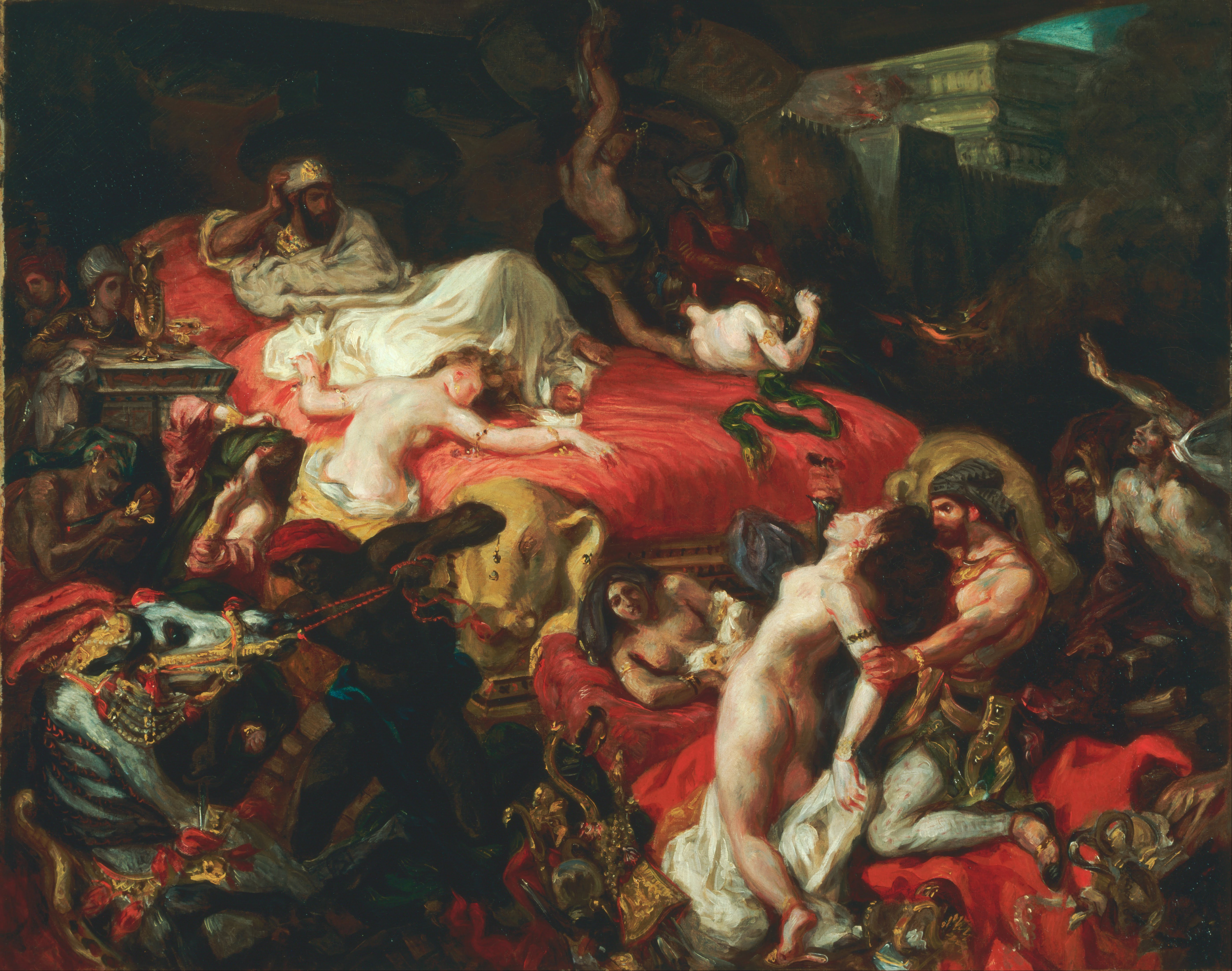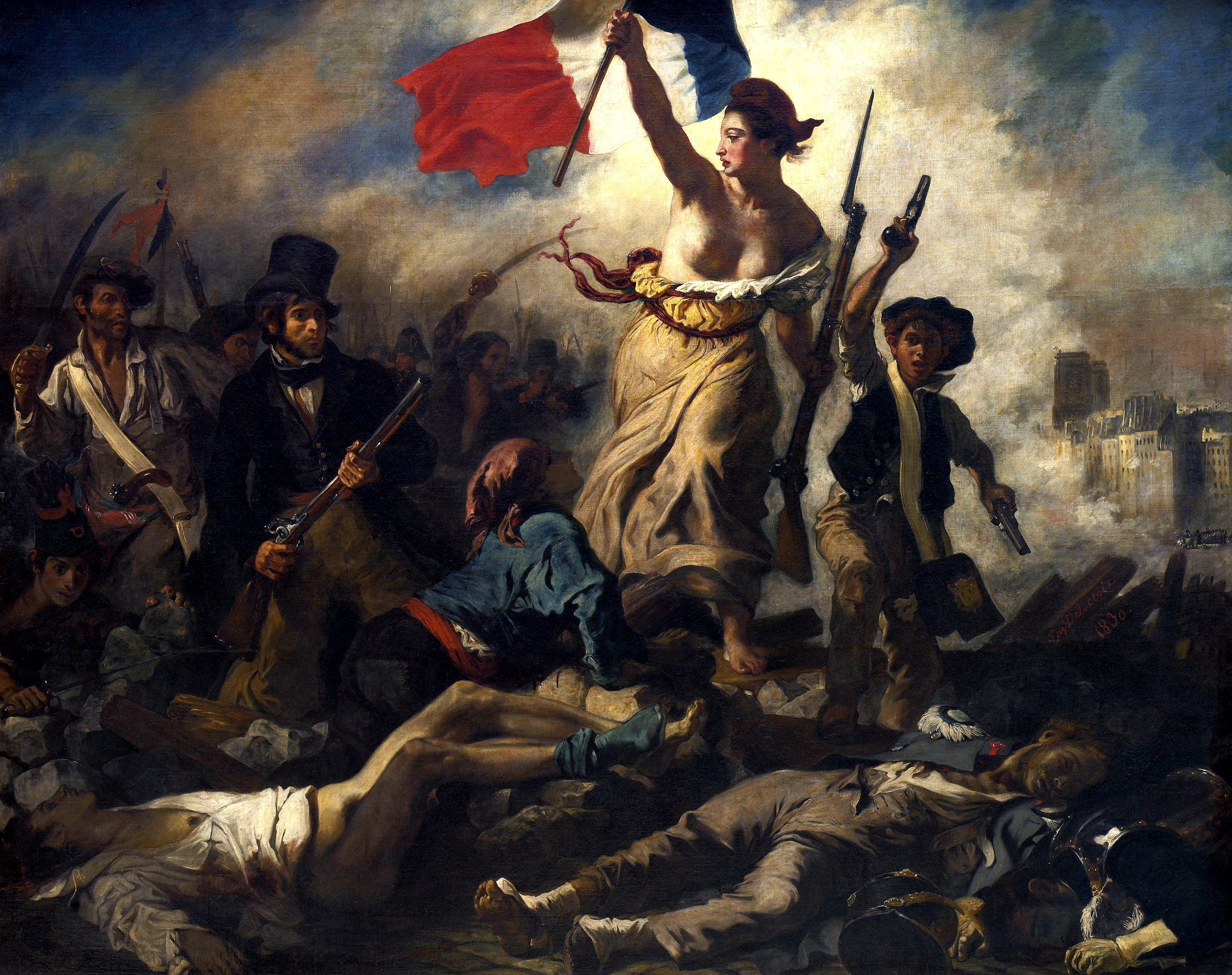Title:Departure From The Isle of Cythera
Artist: Antoine Watteau
Title: Departure from the Isle of Cythera
Date: 1717
Style Period: Rococo
Title: Gilles
Artist: Antoine Watteau
Title: Gilles
Date: 1717
Style Period: Rococo
Title: The Swing
Artist: Fragonard
Title: The Swing
Date: 1766
Style Period: Rococo
Title: Marriage a la Mode II
Artist: William Hogarth
Title: Marriage a la Mode II
Date: 1743
Style Period: Anti-Rococo
Title: Death of General Wolfe
Artist: Benjamin West
Title: Death of General Wolfe
Date: 1770
Style Period: ?
Title: Oath of the Horatii
Artist: David
Title: Oath of the Horatii
Date: 1785
Style Period: Neoclassicism
Title: Death of Socrates
Artist: David
Title: Death of Socrates
Date: 1787
Style Period: Neoclassicism
Title: Napoleon at Saint Bernard
Artist: David
Title: Napoleon at Saint Bernard
Date: 1800
Style Period: Neoclassicism
Title: Madwoman with a mania of envy
Artist: Gericault
Title: Madwoman with a mania of envy
Date: 1823
Style Period: Romanticism
Title: Raft of the Medusa
Artist:Gericault
Title: Raft of the Medusa
Date: 1819
Style Period: Romanticism
Title: Death of Sardanapalus
Artist: Eugene Delacroix
Title: Death of Sardanapalus
Date: 1828
Style Period: Romanticism
Title: Liberty Leading The People
Artist: Eugene Delacroix
Title: Liberty Leading The People
Date: 1830
Style Period: Romanticism
Title: Family of Charles IV
Artist: Goya
Title: Family of Charles IV
Date: 1800
Style Period: Romanticism
Title: Chronos Devouring One of His Children
Artist: Goya
Title: Chronos Devouring One of His Children
Date: 1822
Style Period: Romanticism
Title: Executions of the Third of May
Artist: Goya
Title: Executions of the Third of May
Date: 1808
Style Period: Romanticism
- World War I Aftermath
- The Germans initially refused to sign the treaty, but were forced to.
- No one had seen a modern war like WWI before WWI, and this changed the world
- Spanish Flu Pandemic
- Spanish Flu hit during WWI
- No one knows the origin of the Spanish Flu
- State of Europe and the World by 1920s
- A Relativistic World
- Albert Einstein
- Offered the theory of relativity
- Proposed that gravity, as well as motion, can affect the intervals of time and of space.
- He became a celebrity thanks to a solar eclipse
- Eddington
- He tested Einstein's theory of Relativity
- He was a kind man, and a pacifist who was treated badly because he avoided war.
- He helped to lend credence to Einstein's theory of relativity through his observations of a Solar Eclipse from Principe and Sobral
- Understanding Human Behavior
- Sigmund Freud
- Austrian Psychoanlysis
- Gnostic
- Atheist
- Scientifically studied behavior based on people's dreams and childhood
- However Freudianism is not scientific
- He disliked the concept of guilt
- Art Reflected the World's Sorrow and Chaos
- Dadaism appeared
- Cubism appeared
- Philosophical Underpinnings of Secular World
- Nihilism Became a Thing
- People believed that there was nothing to the world but the world itself
- Will to Power
- People strive not just to be happy or survive, but to impose their will on the world.
- Inter War Period - Weimar Republic
- Economic Turmoil
- Weimar emerges from the socialist revolution in Germany
- It started as weak and unstable as first, due to having no gold, printing money which causes hyperinflation, and the economy was in trouble.
- Germany could not pay the reparations due to their terrible economy.
- Their reparations are owed to France and Britain
- France and Britain then are paying that money to America
- America is then loaning that money back to other countries
- French Occupation of Ruhr
- France occupied an area of Germany to force them to pay their reparations with coal.
- Treaty of Rapallo
- Germany and Russia secretly work with one another to build the German military in Russia.
- Political Ideology Spectrum
- Far Left
- Communism and Socialism
- Atheistic
- Propaganda
- No Private Property
- Classes aren't supposed to exist
- Middle
- Republicanism, Liberalism, Constitutionalism, Free Market, Capitalism, Democracy
- Classes exist
- Far Right
- Fascism and Nazism
- Private Property allowed
- Ultra Nationalistic
- Secret Police
- Racial and Xenophobic
- Classes Exist
- Corporate State
- Propaganda
- Roaring Twenties
- The Economy goes up, and up
- Everyone is buying all these new products
- These new products were one per household products, people only needed so much of these products.
- People start buying shares of corporations like crazy
- America's Great Depression
- Stock Market Crash
- People started borrowing money to buy stock.
- The Stock market crashed and everybody sold their shares at once as they freaked out.
- Treaty of Versailles
- Caused money to go through a rotation from Germany to Britain to France to the US and back to the rest of the nation
- So when the great depression hit, it effected this money rotation and the rest of these nations involved in the rotation
- Banks Failed
- The Banks Closed
- People lost everything they had
- Because Banks Failed, Businesses Failed, Because Businesses failed many people lost their jobs.
- Political Reaction
- Capitalism, Liberalism, and Republicanism is questioned.
- Many nations believed that these capitalism, liberalism, and republicanism were the cause of the Great Depression.
- Nations became Socialist, and guaranteed everyone government jobs.
- Rise of Fascism
- Mussolini
- The Republic of Italy was called inept, and weak by Mussolini.
- Italian inflation caused huge debt and unemployment in the 1920s.
- What did Mussolini do as Prime Minister:
- Complete Censorship
- Eliminated his Opponents
- Made the state Centralized and Corporate
- He is a De facto Dictator
- Hitler
- He served in WWI, and was bitter that Germany lost.
- He joined the National Socialist Party.
- He was at the head of the Beer Hall Putsch to take over the government in Germany.
- This failed and he went to prison, where he wrote the Mein Kampf.
- Part of his prison sentence prevented him from many years to speak publicly.
- He Began politically to try and change the government of Germany.
- Nazism
- Hitler lost an election to become President of Germany.
- The Nazis were the most powerful party in Germany, so Hitler was made Chancellor or Vice President.
- The Emergency Powers are written, and the Enabling Act was made in order to prevent a communist revolution that was staged to cause panic.
- Enabling Act
- Outlawed..
- Freedom of Press
- Freedom to Gather
- Other Political Parties are abolished
- Nazis are placed everywhere
- Hitler's Plans
- Removed foreign music
- Removed foreign literature
- Promoted German art
- Undesirable people are sterilized and known as Asocials
- Hated Communism
- Built up army, navy, air force, and highways
- Hitler's Foreign Policies
- Rejected Treaty of Versailles
- Wanted to Unify all Germans
- Occupied the Rhineland
- Signed a Pact with Japan and Italy
- Annexed Austria
- Seized part of Czechoslovakia, and then the rest of it.
- Signed a non-aggression pact with the Soviet Union
- Neville Chamberlain
- He made an agreement with Hitler
- He believed he had made peace in his time
- He didn't compromise with Hitler, he simply appeased him.
- Beginning of WWII
- Germany Invasion of Poland
- Germany lied to its people and told them that Poland had attacked, Germany in reality simply invaded Poland.
- Working with Russia, they take all of Poland.
- Phony War
- For a year, people believed that WWII wasn't actually going to be a war, as no one was really fighting.
- Invasion of France
- Germany trapped the British and French armies, forcing France to surrender.
- Britain came into assist by sea, but in the end Paris fell.
- Battle of Britain
- Britain had two things to resist the German Invasion
- The Radar
- And Spitfire Agile Planes with Really Good Guns
- Germany repeatedly bombed Britain, but the British Spitfires were too much for them.
- Germany retreats from the battle of Britain.
- German Invasion of Russia
- Hitler hated communists and did not trust Stalin.
- Why did he Want the Ukraine
- For its bread
- For its oil
- So that he can isolate Britain
- The German invasion did well, until winter hit in Russia and the invasion ground to a halt.
- Japan After the Russo-Japanese War
- Japan won the war, but realized they relied heavily on other nations.
- Japan lacked resources.
- Prime Minister and War Minister: Hideki Tojo wanted Japan to be a World Power.
- Manchria
- Japan attacked China multiple times, but this was looked down upon by the league of nations.
- Expansion of Japan
- Japan wanted to expand and not depend on the US and Britain.
- The US didn't want Japan to expand.
- Pearl Harbor
- The US was given a message to announce the Pearl Harbor attack but the message wasn't delivered so the attack seemed like a surprise.
- We lost warships, air crafts, and battle ships.
- US Fighting on Two Fronts
- US and Britain invaded Algeria
- US won North Africa
- Invaded and Secured Sicily
- Patton and Montgomery were allies who did not get along very well, in their mission to invade Sicily
- Operation Avalanche
- Soviets vs Germany
- Siege of Stalingrad
- Stalin moved all of his military and industry behind the mountains and started moving their artillery to Stalingrad and Leningrad just annihilating the Germans.
- Prisoner Policy
- Neither the Soviets or Germany took prisoners
- Operation Overlord
- US Invades Normandy
- Operation Fortitude
- The US tricked Germany into believing they were invading one area, when they were really invaded another.
- Operation Overlord
- Operation Cobra
- US Army raced across France to Paris
- There were giant hedges in the way
- A soldier put a shovel on the front of a tank, and used it to dig out the hedges
- Patton lead the Third Army to Paris
- Operation Market Garden
- Montgomery made a plan to punch a hole through the German line by attacking bridges with artillery and sending paratroopers to hold bridges.
- Once they had the bridges, they would just drive through, however the Germans blow up some of the bridges we needed.
- We had to retreat.
- The Battle of the Bulge
- Germans attacked straight through the American lines, right in the middle of the winter.
- There was very little food, it was in the winter, and very cold.
- It was Hitler's last Gamble.
- Patton came in and saved the day.
- Strategic Bombing Campaign
- We started bombing places
- Soviets took Berlin
- England Victory in Europe
- Pacific War
- The Japanese did not accept surrender, and treated prisoners harshly.
- The US lost the Philippines to Japan
- Prisoners were forced to walk across the Philippines
- Doolittle Raid
- We shocked Japan with a military response to Pearl Harbor, not much happened.
- Battle of Midway
- Japan wanted to take Midway, so that they could then take Hawaii from the US.
- US Code breakers learned that Japan was going to try and take midway.
- Admiral Nimitz had the Yorktown carrier refitted in 72 hours and then placed the feet northwest of Hawaii to ambush the Japanese.
- We put Japan on the defensive and saved Midway.
- War in the Pacific
- Battle of Iwo Jima
- US pushed toward the Japanese Home Islands
- Japan didn't want to surrender
- Japanese Soldiers were in caves on the island
- Battle of Okinawa
- This was the first battle of the US against Japan itself, on land a part of Japan.
- There were thousands of civilians, some of which committed suicide, others committed suicide using bomb vests to battle the US.
- There were many kamikaze missions.
- Operation Downfall
- Cancled invasion of Japan
- Would have weakened Japan and the US
- World War II Diplomacy and Strategy
- The Allies accepted nothing but unconditional surrender of the Axis.
- Benefits Back Home
- Women worked
- Many minorities helped with the war effort
- American Paranoia
- Japanese Concentration Camps in New Mexico and Arizona
- Manhattan Project
- Army Corps of Engineers initiated it
- The best scientists were assembled in the dessert
- Billions of dollars were spent on the nuclear bomb
- Ending the Pacific War
- Results of WWII
- Innovations
- Technology
- Code Breaking
- Radar
- Nukes
- USA was dominant
- The USSR Emerges
- Isolationism becomes impossible as the US becomes bound to Europe
- Imperialism
- Definition
- Effort of one nation, to dominate over another
- Transformation of Japan
- Japan changed from being a feudal system to an empire
- During the feudal era there were:
- Japan for a time was Xenophobic
- They didn't trust most who arrived in Japan
- Had Many Problems Due to Not Trading with the West
- Commodore Matthew Perry Traveled to Edo and Forced Japan to Trade
- At this time the Japan military was called Tokugawa
- These events lead to a civil war which shapes Japan
- The Result of the Civil War
- A New Leader Takes Hold
- A stronger central government was formed
- The Samurai Class was Abolished
- He Reformed the Tax System
- Experts were brought in from other areas to help modernize Japan and its military
- An Industrial Revolution Takes Place
- Their Businesses Evolved
- The Zaibatsu were formed
- The Shoguns of Business
- Each Business Worked Together to Keep Each Other Running and Successful
- It is dissolved by 1945
- Imperialism in Africa
- By the late 1800s, Europe begins dominating Africa
- Reasons For African Imperialism
- Prestige
- Conservative Nationalism
- Social Darwinism
- Natural Selection Applied to Politics
- There was a belief that white races were more superior
- To Spread the Gospel
- Humanitarianism
- Economic Gain
- Berlin West Africa Conference
- Cecil Rhodes
- He was a prominent businessman and imperialist
- He wanted to Britain to Dominate Africa and India
- Boer War
- The British fought the Dutch over South Africa
- The Dutch were already there
- The British were trying to take it
- It was a big blow for the British
- Imperialism, Social Darwinism, and Scientific Realism
- Count Arthur de Gobineau
- He was a racist scientist, who believed that each race was its own species and that white people were the superior race.
- Imperialism and Japan
- Using their new capabilities gained through the Industrial Revolution They Declare War on China Over Korea
- Korea and Taiwan give up by Qing China 1895
- Russia and Japan get into a War
- Japan defeats Russia to the world's surprise
- The Balance of Power In Europe Is Blown Away
- What Was Good About the Holy Roman Empire
- It wasn't threatening at all
- All city states functioned on their own
- Unification has made nations more threatening as they are now united.
- Three Emperors League
- Montenegro Defeat Ottomans
- Russia helped Serbia to Defeat the Ottomans
- That is because Russia wanted to have a warm water port.
- Bulgaria was created as a large and strategic Russian Satellite
- Congress of Berlin
- Bismark (Germany) Dominates the Congress
- France is Left Out of the Congress
- France is isolated because they want revenge against Germany for what happened in Versailles.
- New Nations Are Formed
- Serbia
- Montenegro
- Romania
- Russia Was Humiliated, due to these new nations making Bulgaria less of a power.
- Austria occupied Bosnia, Herzegovia
- The Balkans
- Who Wants the Balkans?
- Russia
- Wants a warm water port in the Balkans
- Austria
- Italy
- The Bismarckian System
- Bismark
- Believed in the politics of reality or Realpolitik
- He Banned the Socialist Party
- He is German
- He Persecuted the Catholic Party
- He wanted to keep the other nations talking with each other and not fighting
- Wilhelm II
- Ascended 1888 to power in Germany
- He Was Bipolar
- He was pro-austrian
- He was anti-russia
- He did not agree with the Bismarkian System
- He believed himself to be infallible
- When He Was Being Born
- He was forced out of the womb, and crushed his arm.
- This forced him to have a deformity
- This deformity made him an insecure bully
- Youth
- His Grandmother was Queen Victoria of England
- He used to admire the naval ships of England
- Imperialist Ideas
- He wanted Germany to have colonies around the world
- He wanted Germany to have a huge Navy
- Wilhelm vs Bismark
- Wilhelm dismissed Bismark
- Bismark was keeping the nations at peace
- Wilhelm wanted more and took power to gain it.
- Bismark kept Russia close, and France Isolated
- Militarism and Imperialism on the Rise
- Alliances
- France and Russia Form a Military Alliance in 1894
- Britain and France Allied in Entente Cordiale in 1904
- When Germany Emerges With Bismark's Absence, and Becomes More Powerful Militarily, Britain Searched For An Alliance.
- Britain does not ally with Germany, because Willhelm II was a spoiled little shit.
- Open Door Policy
- In America in 1905 during the Rosevelt Administration
- There are no taxes on imports, and America believed in free trade.
- Free Trade fosters pure competition in the market
- This Open Door Policy is the opposite of Protectionism
- Protectionism believes in high taxes on imports
- Nations are Not Self Efficient
- Countries depend on one another in order to sustain their society.
- Triple Entente
- Triple Alliance
- Willhelm's Desire for a Stronger Navy
- He reads a book that claims that Britain's Navy is what made them a world power
- Now more than ever Willhelm desires a stronger Navy in order to make Germany more of a world power
- Schlieffen Plan
- Germany is secretly planning for a war
- They know that France wants revenge on them, so they are planning ahead
- This plan was made by Alfred Von Schlieffen to eliminate France and Russia
- He wants to send all of Germany's power to France as France would mobilize first so that they can take Paris.
- The idea was for Germany to go around the large fortifications that France had developed through their towns and take Paris.
- Assination in Sarajevo
- The Black Hand
- Wanted independence from Austrian Rule
- Group of Assassins
- Gavrilo Princip
- Member of the Black Hand
- Assassinated the Arch Duke of Austria and his Wife
- World War One Begins
- Ultimatum
- Austria makes an ultimatum with Serbia
- Serbia accepts the ultimatum from Austria
- Austria declares war on Serbia
- Due to bad communication the war begins even though Serbia accepted the ultimatum
- Austria was given funding by Germany and had Germany as a huge ally.
- Russia Declares War on Austria because they declared war on Serbia
- Germany declares war on Russia
- France declares war on Germany and so does Britain
- The Schlifen Plan is Activated
- Causes of World War One
- Militarism
- Nationalism
- Imperialism
- German belligerence
- French Vegeance
- Two Armed Camps
- Triple Entente
- Triple Alliance
- World War One
- The Rules of War
- The Rules of War have changed
- War used to be short
- War used to be lines of men vs lines of men
- Wars before this time, were before the industrial revolution.
- Before technology hadn't been so advanced, so powerful
- War now was:
- More violent
- Began with an artillery barrage, in which each side started by just blowing each other away
- Men would line up in the trenches, then get out of the trenches and run at the enemy line, with machine gun bullets flying everywhere.
- The military didn't know how to deal with the weapons they had.
- Horrors of Trench Warfare
- Filled with Blood, urine, and poop
- Where the soldiers slept, fought, and lived during the time of war.
- US During WWI
- US Remained Neutral
- Until the Lusitania was sunk by Germany
- Lusitania was a ship containing war military for Germany's enemies
- The US warns Germany not to sink any of their ships anymore.
- Germany cooled off, and stopped just recklessly sinking ships, but then decided fuck it, sink everything again.
- Germany tried to secretly make a deal with Mexico, but the information was intercepted and published openly to the media
- The US could no longer stay neutral
- The US shipped millions of men to Europe, and sways the balance of the war in favor of the allies
- The US pushed the Germans back with their power.
- Germany's government changed and William II ran away.
- Technology of the World
- Chemical Weapons
- Poisonous Gas
- Machine Guns
- Blimps
- Tanks
- Air planes
- Results of The War
- Most devastating war ever
- France was ravaged
- The Emperors of Germany were kicked out
- The Habsburgs were kicked out of Vienna
- The Romanovs are kicked out of Russia
- Germany is Blamed for the War
- Treaty of Versailles
- The nations met in the hall of mirrors to discuss peace for the world after World War One.
- Big Nations Met
- President Woodrow Wilson, US
- President During World War One
- He was a progressive liberal
- He used to be a:
- Historian
- President of Princeton University
- Governor of New Jersey
- He was an academic and very idealistic
- Prime Minister David George, Britain
- Prime Minister Orlando, Italy
- And more....
- Woodrow Wilson's Fourteen Points of the Treaty of Versailles
- The Formation of a League of Nations
- Free Trade
- Free Navigation
- France gets its frontier on the border of Germany returned to it
- Open Diplomacy was promoted
- Self Determination was established, where people could choose their own destiny
- Many Nations hated this idea
- Multilateral Disarmament
- Germany and Austria Hungary were forced to sign the treaty
- Guilt Clause
- Effects
- Germany lost all colonies
- Had to pay high reparations
- Had to relinquish bulk of merchant ships
- Had to deliver significant portions of coal to neighbors as a part of reparations
- They had to demilitarize the Rhine Land, and the German military was more or less disarmed.
- Hausburg Empire is Disbanded
- Polish Corridor is Created
- Ottoman Empire ceases to exist
- Palestine, Iraq and Tranjordan, are given to Britain
- Ultimate Results Of the Treaty
- No one got what they wanted
- Cooperation did not happen
- The Roaring Twenties happen in the US, and our country didn't consider itself a world power.
- Britain turns its back on the treaty
- John Maynard Keynes
- Talks shit about the treaty
- By 1920, the treaty is being openly questioned and criticized.
- Russia in Trouble - Revolution
- Nicholas II is the autocratic ruler of Russia, and is heavily separated from the peasants of Russia and their turmoil
- This leads to a revolution in which peasants battle against soldiers
- Industrialization hits, and suddenly the cities balloon with people.
- Famine spreads
- Factories are dangerous
- Nicholas II's heir was Aleksey, but he was very sick and nearly dies several times due to his blood disorder.
- Rasputin was an orthodox priest and mystic.
- He helps to improve Aleksey
- Nicholas II puts his wife in charge, and his wife puts Rasputin in charge.
- Rasputin loved women and partying, but at the party he was poisoned by officials who hated him.
- The poison had no effect on Rasputin.
- The officials straight up Julius Caesared him, but no matter what they do, he wouldn't die.
- They threw him in a river of ice after shooting, stabbing him, and beating, but he escaped the river and then died.
- Nicholas ignores the trouble in Russia
- Soviets form
- Gatherings of comittees of workers to discuss a better Russia
- Liberal Government is Established in Russia in 1917
- Karensky wanted democratic reform, but also to keep fighting WWI.
- Lenin, Stalin, and Trotsky who are radical socialists start a revolution in Russia.
- They make a deal with Germany and secretly give them a ton of land, to get Germany off the line.
- Totalitarianism
- Soviet Union becomes a thing
- Socialism rejects private property
- Because private property is what distinguishes one class from another
- Private property is distributed to everybody
- The KGB is formed
- Collectivization is started
- Anyone who resists the change, dies
- Stalin imposes slavery
- Stalin starts making five year plans
- This pushes production to new heights
- The Russians are encouraged to work
- Lenin died, Trotsky was killed by Stalin, Stalin took power
- Purges and Personality Cults were started
- If you work for Stalin and show initiative, Stalin kills you
- If you don't care, and your incompetent, Stalin kills you
- All that is left are like C+ level performers
- This causes everything to kind of suck
- The Romanov's were killed off in the basement.
- Muckrakers
- Those who wrote about social injustices
- The Gilded Age
- The age in America where the rich were rich, but the poor were very poor.
- Jacob Riis
- He helped to show others how bad the world was, so that the world would be a better place through his photography.
Artist: Jean Auguste Dominique Ingres
Title: Oedipus and the Sphinx
Date: 1808
Style Period:
Page Number: 699
Artist: Jean Auguste Dominique Ingres
Title: Grande Odalisque
Date: 1814
Style Period:
Page Number: 700
Artist: Theodore Gericault
Title: Raft of the Medusa
Date: 1819
Style Period: Romanticism
Page Number: 715
Artist: Theodore Gericault
Title: Madwoman with a Mania of Envy
Date: 1822
Style Period: Romanticism
Page Number: 715
Artist: Delacroix
Title: Death of Sardanpalus
Date: 1827
Style Period: Romanticism
Page Number: 718
Artist: Delacroix
Title: Liberty Leading the People
Date: 1830
Style Period: Romanticism
Page Number: 719
Artist:
Title:
Date:
Style Period:
Page Number:
Artist:
Title:
Date:
Style Period:
Page Number:
Artist:
Title:
Date:
Style Period:
Page Number:
Artist:
Title:
Date:
Style Period:
Page Number:
Artist:
Title:
Date:
Style Period:
Page Number:
Artist:
Title:
Date:
Style Period:
Page Number:
Artist:
Title:
Date:
Style Period:
Page Number:
Artist:
Title:
Date:
Style Period:
Page Number:
Artist:
Title:
Date:
Style Period:
Page Number:
Artist:
Title:
Date:
Style Period:
Page Number:
Artist:
Title:
Date:
Style Period:
Page Number:
Artist:
Title:
Date:
Style Period:
Page Number:
Artist:
Title:
Date:
Style Period:
Page Number:
Artist:
Title:
Date:
Style Period:
Page Number:
Artist:
Title:
Date:
Style Period:
Page Number:
Artist:
Title:
Date:
Style Period:
Page Number:
Artist:
Title:
Date:
Style Period:
Page Number:
Artist:
Title:
Date:
Style Period:
Page Number:
Artist:
Title:
Date:
Style Period:
Page Number:
Artist:
Title:
Date:
Style Period:
Page Number:
Artist:
Title:
Date:
Style Period:
Page Number:Artist:
Title:
Date:
Style Period:
Page Number:
Artist:
Title:
Date:
Style Period:
Page Number:
Artist:
Title:
Date:
Style Period:
Page Number:
Artist:
Title:
Date:
Style Period:
Page Number:
Artist:
Title:
Date:
Style Period:
Page Number:
Artist:
Title:
Date:
Style Period:
Page Number:
Artist:
Title:
Date:
Style Period:
Page Number:
Artist:
Title:
Date:
Style Period:
Page Number:
Artist:
Title:
Date:
Style Period:
Page Number:
Artist:
Title:
Date:
Style Period:
Page Number:
Artist:
Title:
Date:
Style Period:
Page Number:
Artist:
Title:
Date:
Style Period:
Page Number:
Artist:
Title:
Date:
Style Period:
Page Number:
Artist:
Title:
Date:
Style Period:
Page Number:
Artist:
Title:
Date:
Style Period:
Page Number:
Artist:
Title:
Date:
Style Period:
Page Number:
Artist:
Title:
Date:
Style Period:
Page Number:
Artist:
Title:
Date:
Style Period:
Page Number:
Artist:
Title:
Date:
Style Period:
Page Number:
Artist:
Title:
Date:
Style Period:
Page Number:
Artist:
Title:
Date:
Style Period:
Page Number:
Artist:
Title:
Date:
Style Period:
Page Number:
Artist:
Title:
Date:
Style Period:
Page Number:


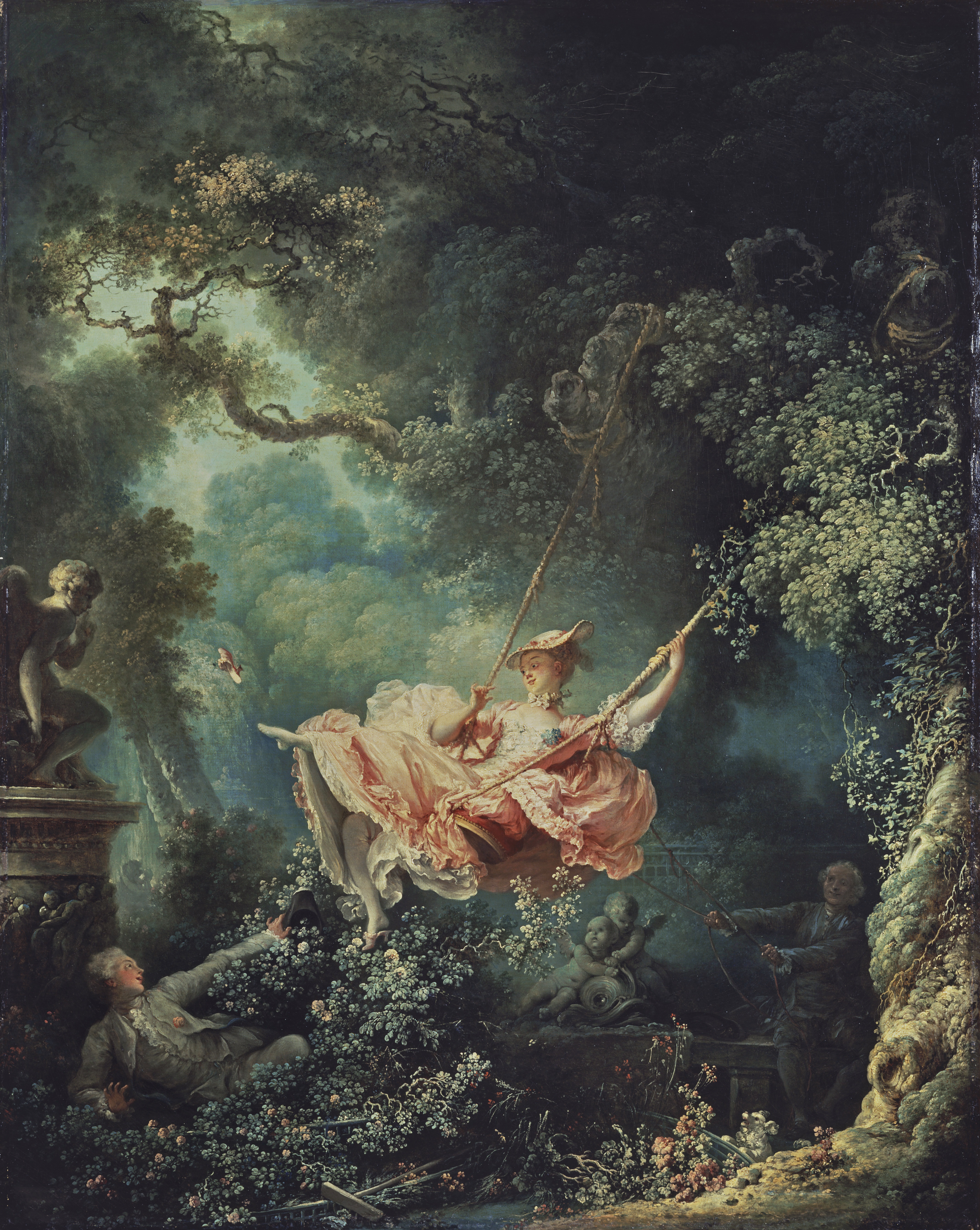
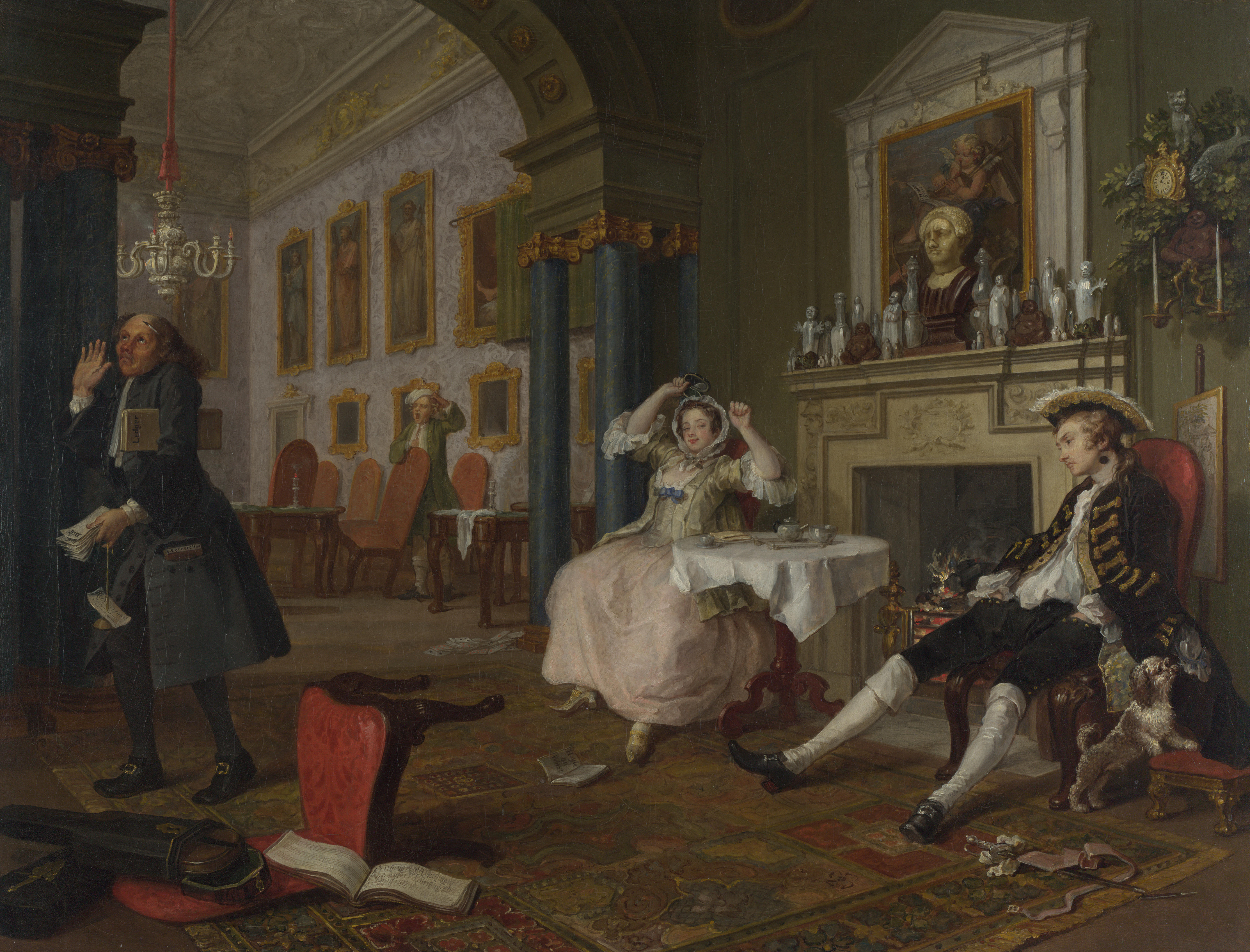
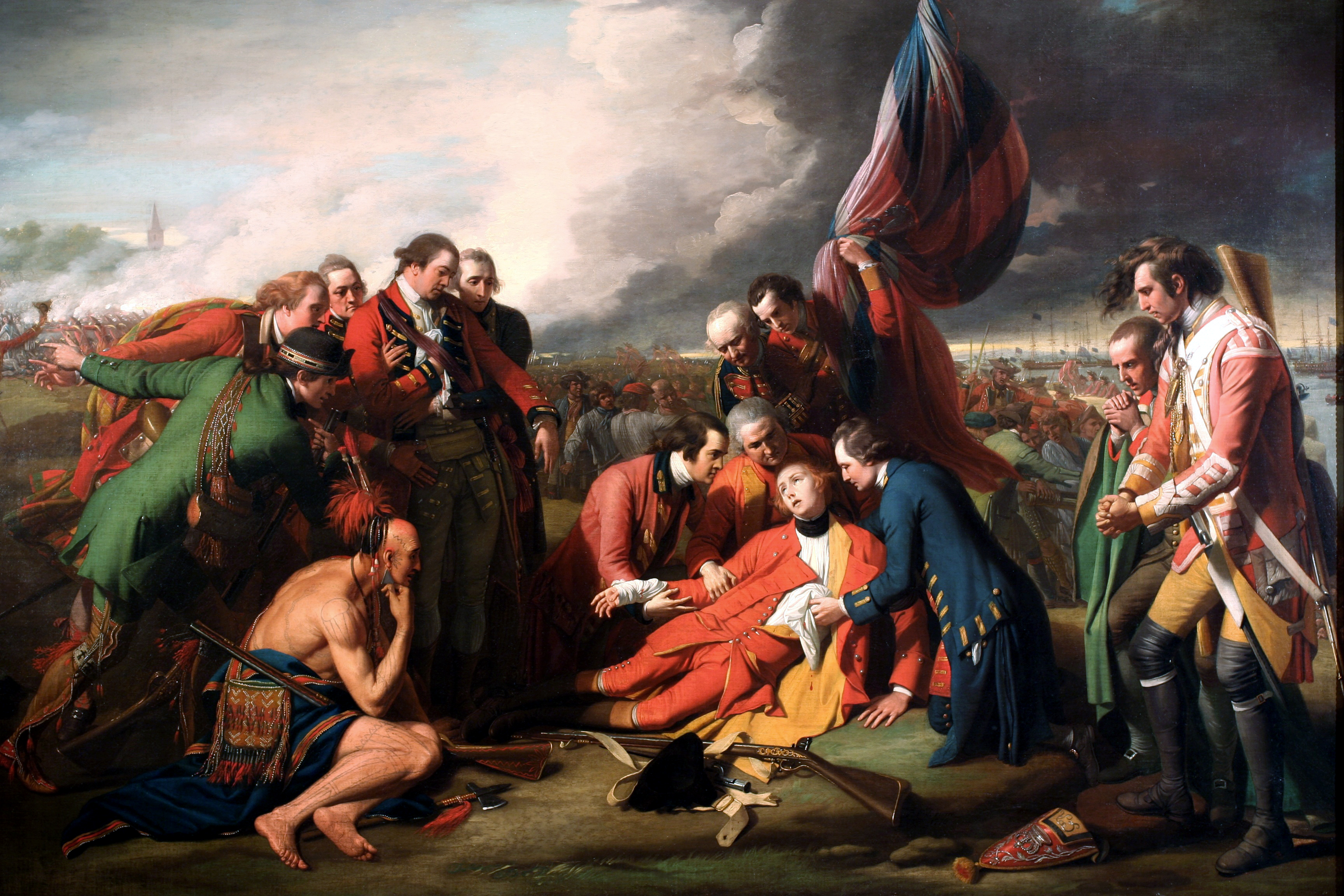



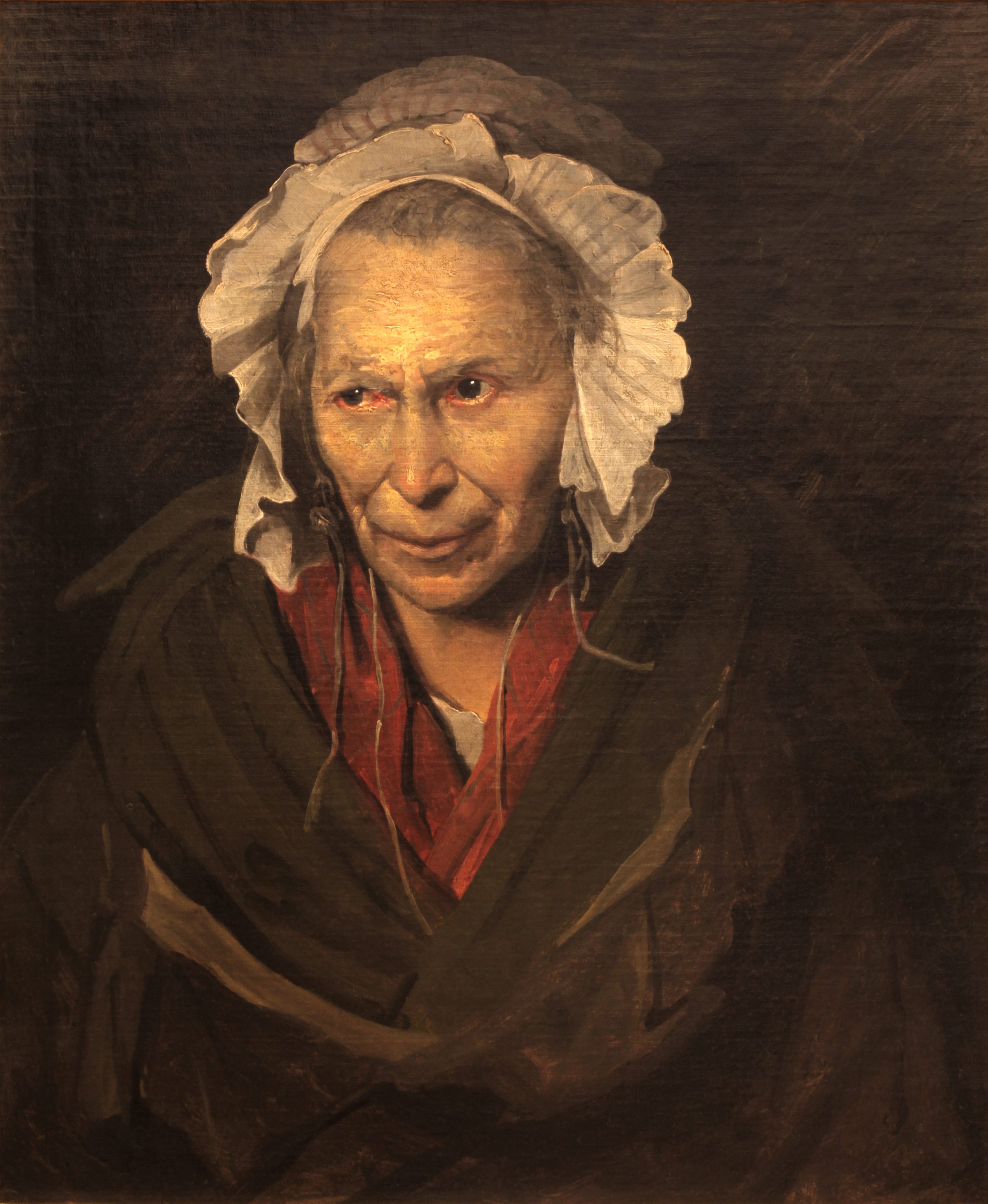
.jpg)
